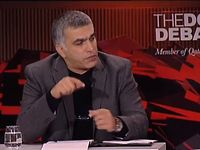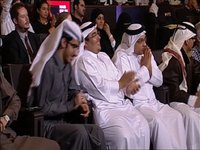This House has no confidence in Bahrain's promise to reform
Monday December 12 2011
MOTION PASSED
by 78% to 22%
Transcript
Order of speeches
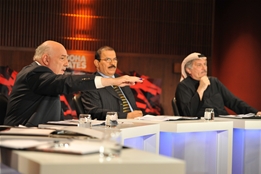
- Introduction
- Nabeel Rajab
- Khaled Almaeena
- Christopher Davidson
- Abdulla Alderazi
- Audience questions
- Vote result
Introduction
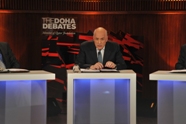 TIM SEBASTIAN
TIM SEBASTIAN
Ladies and gentlemen, a very good evening, and welcome to the latest in our series of Doha Debates, coming to you from the Gulf State of Qatar and sponsored by the Qatar Foundation. An independent report into the shocking violence earlier this year between opposition demonstrators and security forces in Bahrain was published last month and it makes chilling reading. Prisoners were hooded, whipped, beaten and subjected to electric shocks. At least five died during the torture. Female prisoners were threatened with rape. Hundreds arrested, thousands sacked from their jobs, although most have been reinstated. One newspaper editor in the Kingdom said: "People have seen hell. We've seen people killed. We've seen curfews. We know that people could be shot dead or disappear at a checkpoint. Society is crippled." The King said he too was shocked by the report but accepted it, promising that laws would be changed and the guilty held to account. There would be compensation for victims, he said; guilty verdicts on opposition members would be re-examined. But how credible are those promises? That's the question we ask you to address tonight. Our motion is, as always, controversial: 'This House has no confidence in Bahrain's promise to reform.' And our speakers differ fundamentally on the issue. Speaking for the motion: Nabeel Rajab. He's President of the Bahrain Centre for Human Rights. He's also Deputy Secretary General of the International Federation for Human Rights, and this year won a Democracy Award from the Woodrow Wilson Centre in the US. And with him, Christopher Davidson: Reader in Middle East Politics at the University of Durham in the UK, he is the author of a number of books on the region. His next one is called: After the Sheikhs: The Coming Collapse of Gulf Monarchy? I should point out there's a question mark in that title. Against the motion: Khaled Almæena, Editor-at-large of Arab News, the first English language newspaper in Saudi Arabia. He travels and speaks widely and is a regular contributor to regional and international publications. And Abdulla Alderazi: he's a lecturer at the University of Bahrain, College of Arts and a member of the Bahrain Human Rights Society. He was recently appointed to the government Commission tasked with responding to last month's report into the violence. Ladies and gentlemen, that's our panel. [Audience applause] So now let me ask Nabeel Rajab to speak for the motion, please.
Nabeel Rajab
Speaking for the motion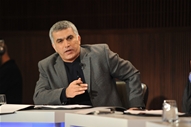
NABEEL RAJAB
Thanks everybody and I'm happy to be here. As you all know, my country witnessed an uprising last February as we were inspired by the Arab revolution and Arab Spring. Unfortunately this uprising was met with a violent crackdown where at least 50 people were killed. Thousands of people were detained, systematically tortured, electrocuted, hanged, beaten, sexually harassed and raped. Thousands of people were fired from their work, from their school, from their university. We were fighting for the same demand that we were fighting for the past 80 years - 20s, 40s, 60s, 70s, 80s, 90s: social justice, democracy, freedom. The same demand that we were always promised by the regime, that they would reform themselves, that things are going to be better; but always those promises were not met by the regime. Again, the same King who is talking today about the report, he is the same King who has in 2001 signed and talked in the newspaper saying that we're going to have a proper reform, we're going to have a parliament that has all power to legislate, we're going to have the same constitution that we had in the 70s. The King did not keep his promise. The same Prime Minister who has been there for the past 42 years, who is responsible for human rights violations, corruption; a tenth of the people were killed during his time. We and myself don't think the same Prime Minister, who is part of the problem, or who is all the problem in Bahrain, could in any way be part of the solution. And that's why I don't think this government, which has been there for quite a long time, responsible for all those crimes committed against humanity, and crime and violations, as we have seen in the United Nations human rights groups and the latest Bassiouni report.
TIM SEBASTIAN
Would you come to a close, please.
NABEEL RAJAB
I don't think that government is capable or able to carry any kind of reform process. Thank you.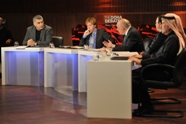 TIM SEBASTIAN
TIM SEBASTIAN
Okay. Nabeel Rajab, thank you very much indeed. This is the King who ordered an independent report into what had taken place, which came up with massive serious violations. He accepted it, he went public with it, he's had to endure the shame that went with that - and you don't think he's serious about this? Nobody's ever done this before. No government has ever done this before.
NABEEL RAJAB
That was smart of him to distance himself from responsibility and distance the members of his family, as they were responsible for most of the violation, including his total..
TIM SEBASTIAN
Why does he distance from it? He's accepted the report.
NABEEL RAJAB
Because the United Nations is supposed to send a team of investigation. To prevent that team, he created his own Commission. And you don't expect..
TIM SEBASTIAN
And what is wrong with the Commission?
NABEEL RAJAB
You do not expect to see the report of the Commission will accuse the King who formed the Commission.
TIM SEBASTIAN
What was wrong with the Commission? The Commission had highly respected people on the Commission.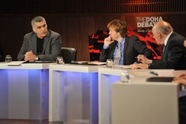 NABEEL RAJAB
NABEEL RAJAB
There are a lot. The Commission talked about crimes; it did not talk about criminals.
TIM SEBASTIAN
It may not have used that word, but it came up with a lot of activities that violated international law. And it said so repeatedly, didn't it?
NABEEL RAJAB
Yes. No, there are a lot of things. I totally disagree. There are a lot of things positive in the report, but, yes, it is not a reform process. The report talks about the human rights violation in February, March and April, so this cannot be in any way a reform process, number one.
TIM SEBASTIAN
Why not? Why not?
NABEEL RAJAB
Number two, there was supposed to be a human rights team coming to investigate in Bahrain. And at the request of my government they stopped that team from coming.
TIM SEBASTIAN
Nabeel Rajab, it uncovered serious systemic failures. It didn't just talk about the violence; it talked about the courts, it talked about the press, it talked about the way laws were used - and abused, according to the Commission. You don't think the King is serious after doing that? How could he possibly go back on his word, having gone so public?
NABEEL RAJAB
You can't just talk about evaluating things from words or articles. You evaluate things from implementation, from practice.
TIM SEBASTIAN
Okay, so all cases related to death and torture have been referred to the Prosecutor.
NABEEL RAJAB
Three or four weeks the report is out. The things are the same things on the ground. Those people who are responsible for the crimes committed against humanity, they were awarded, they were upgraded, they were given a better job. The guy heading the security apparatus, today he's heading a higher position. The violence in the street is the same going on. Yesterday a child of five days old died because of the violence.
TIM SEBASTIAN
Okay. Nabeel Rajab. Okay, you've made the point. Nabeel Rajab, thank you very much indeed. Now could I ask, please, Khaled Almæena to speak against the motion, please.
Khaled Almaeena
Speaking against the motion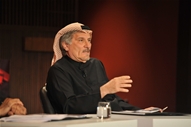
KHALED ALMAEENA
Well, I think while we all agree that what happened in Bahrain was extremely sad and unfortunate and bloody and it should never have happened, the reason I think there will be reforms is because the focus of the world is now on the Arab world. Forget the Arab Spring on the side, but also the focus on the GCC countries. At the same time there's a new group of people in the GCC. No more is a one-way communication. There is a young group - 50 percent of the GCC population is under 35 - and they would really like to see and play a bigger role. Now, why I think reforms are there in the offing is because no longer can the leaders of the GCC or the authorities or those people in power or the police afford to ignore these people. Reform is a process, not a remedy, and it's not an analgesic or you're giving an aspirin; it's a continuing process. And what happened in Bahrain was an eye-opener for other countries in the region that you have to take people's aspirations no more [sic] and they will always say as when I was growing up, as "aish el tabkha" ." Now, if you tell that to a young guy, he'd say "Go to hell. We are abkhas. We know more, abkhas means "We know." So I really think young people will not take the nonsense they took before. At the same time, I think we have to give the Bahraini government some credibility. They have released prisoners - yesterday I read that 70 or 80 of the players have been released. But I really think these are cosmetic things and it should be enforced and enlarged so that all those people arrested and jailed should be released under a direct amnesty from the King. And once that is done, then I think the reform process would go ahead. But I really believe - and this is a gut feeling, and many others - that nobody in the Gulf can afford to have repression or suppress people as was being done before in the Arab world.
TIM SEBASTIAN
Khaled Almaeena, thank you very much indeed. You talk about new people in the GCC. There aren't new people in power in Bahrain, these are the same people who've allowed this culture of impunity that the report talks about and previous cases of torture which were highlighted by the UN as far back as the 2003, as far back as the 09s. How come you have faith in these people? These are the same people who've kept this system going.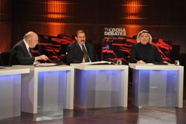 KHALED ALMAEENA
KHALED ALMAEENA
But I have faith in the young people, the people who are now using Twitter and using Facebook and aren't taking no for an answer. They would really like to play a bigger role. Now, if anything happens..
TIM SEBASTIAN
But they can't play a bigger role when these people are still in power and torturing them, can they?
KHALED ALMAEENA
They cannot, but I think there are many ways to get the world's attention to highlight on what happens. And I really believe it's a two-way street. I do agree that both sides have to give in. Reforms are not an emotional blackmail on the part of people, nor a threat. I think that those in power should go ahead, but there are...
TIM SEBASTIAN
But look at the signs. I mean, what Nabeel Rajab was talking about - the Security Minister, for instance. I mean, he's now been made, what is it, Secretary General of the Supreme Defence Council. He's now Security Advisor to the King. This is the man who oversaw what the report calls this "systematic abuse".
KHALED ALMAEENA
Yes, and I think this is unfortunate. I think really whether it's the Bahraini..
TIM SEBASTIAN
It's a bit more than unfortunate, isn't it?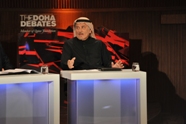 KHALED ALMAEENA
KHALED ALMAEENA
Whether it's the Bahraini government or others, they should really come up to see that there will be transparency and accountability.
TIM SEBASTIAN
But it's not happening, is it, if you go and promote the people who oversaw this abuse. What signal does that send to the rest of the world?
KHALED ALMAEENA
Oh, it gives a bad signal, I would agree. But at the same time I think that there should be more voices heard by the people themselves through media or through an alternative media.
TIM SEBASTIAN
The media is biased. The report pointed it out. It said that the media in Bahrain is biased towards the government of Bahrain.
KHALED ALMAEENA
Well, all Arab media is biased, unfortunately. But what we can do is use other means. And there is an alternative media across the Arab world which young people are using. Because nobody takes seriously a media that ignores the aspiration of 80 percent of the people - which would be biased. But I think we have to find other ways to go ahead and get our point across.
TIM SEBASTIAN
You think the Saudis are beginning to regret taking part in this human rights disaster by going in to assist the government of Bahrain?
KHALED ALMAEENA
Well, I mean, there were all kinds of ruses used, as we all know. The GCC are called and the GCC club and getting people across now, whether right or wrong. But I really believe that Bahrain could have solved this issue in its own domestic yard by itself.
TIM SEBASTIAN
Okay, all right. Khaled Almaeena, thank you very much indeed. Now could I ask, please, Christopher Davidson to speak for the motion.
Christopher Davidson
Speaking for the motion
CHRISTOPHER DAVIDSON
Good evening ladies and gentlemen. As the same as many people in the room, I've been transfixed with a mixture of curiosity, awe and slight trepidation watching these various Arab Spring movements over the last several months. Many of the people of these countries are still facing violence on the streets and a very uncertain future, but at the very least they've managed to topple their dictators and are looking forward to a very brave new world. There is, of course, a forgotten corner of the Arab Spring which I would argue has not received due coverage, and that's the island kingdom of Bahrain, where, as I was discussing with colleagues last night and this morning, if one tries to work out the per capita political activity that's taken place in Bahrain, the number of people of Bahraini citizens on the street, one would probably find it far exceeds those of some of the other Arab Spring movements elsewhere in North Africa and the Middle East. Crucially what we should not forget is that the beginnings of the Bahrain protests on February 14th 2011 began with very humble objectives: not to necessarily topple their long-serving King, nor to topple their much longer-serving unelected Prime Minister - who, we shouldn't forget, has been in power for nearly 40 years now since Britain left in 1971. Instead the objectives were simply to get the King and the ruling family to honour their promises made all the way back in 2001, where the King promised his people a return to the original constitution, to honour that constitution of the early 1970s and the short-lived parliament between 1973 and 1975. The people were not after the removal of the al-Khalifa dynasty, just that the promises on those reforms would actually come good. As we've seen over the last decade, the Emir has made himself a King and the people have more or less got nothing. How has this been the case over the last decade? Well, the Bahraini ruling family have managed to construct a narrative which has been greatly accelerated in the wake of the violence over the last several months, a narrative constructed to persuade the region and the international community that there's some kind of sheer fifth column in Bahrain that, if they came to power - through some kind of democratic movement - would end up as de facto agents of Iran. The international community should be scared of that, because it would allow Iran a foothold very close to the onshore and offshore gas fields of the Gulf monarchies, and the world should stop this from happening.
TIM SEBASTIAN
Could you please wrap up.
CHRISTOPHER DAVIDSON
What we've seen also are several attempts to apply commissions, national dialogues and, of course, the Bassiouni report, which my colleagues and opponents will discuss at length, I'm sure. I would argue this is just yet more window-dressing, papering over cracks, short-term measures rather than genuine reform. Thank you.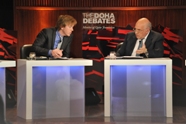 TIM SEBASTIAN
TIM SEBASTIAN
Okay. Christopher Davidson, thank you very much indeed. The King among other things has done something that not only he has never done before but no ruler in this region or elsewhere in the world has actually done: hired a Commission to investigate itself. Surely that is a sign that things are changing. Isn't that the biggest sign of all?
CHRISTOPHER DAVIDSON
I think it's desperate measures for desperate times. The King not only commissioned a report but invited..
TIM SEBASTIAN
That's a spin, isn't it? I mean, he did it and he's lived with the consequences of it, and the shame of it. Because there is a lot of shame..
TIM SEBASTIAN
Yes, absolutely. But we have to understand this perhaps in the context of royal factionalism within Bahrain. We're told a story, a spin, in the rest of the world that this is the King trying to offer something to his people, trying to initiate some genuine reform and dialogue; but instead this may be a case of the King trying to get ammunition and leverage to distance himself from a certain part of the regime, namely the Prime Minister and the security services.
TIM SEBASTIAN
Distance himself or actually take it over, or actually control it?
CHRISTOPHER DAVIDSON
Well, I'd be very surprised if he had the power and resources to actually take over. I think we need...
TIM SEBASTIAN
Look at some of the steps that the report actually talked about that are being done.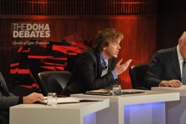 CHRISTOPHER DAVIDSON
CHRISTOPHER DAVIDSON
None of the political prisoners have been released thus far.
TIM SEBASTIAN
Release of 310 people. This is what the Bassiouni report talked about. The transfer of all misdemeanour cases from the National Safety Court to ordinary courts. Providing for the right of appeal to ordinary civilian courts. This is a change in Bahrain, isn't it?
CHRISTOPHER DAVIDSON
Several hundred still in jail. The shadow report done by Human Rights Watch has highlighted their plight.
TIM SEBASTIAN
Yes, but you can't deny that these are steps, these are concrete steps. We're talking about three weeks as we're sitting here, three weeks since the report is published.
CHRISTOPHER DAVIDSON
Plus no names are mentioned. The report is very vague in its findings, talking about the security establishment in extremely vague terms, which allows the King and the regime to very carefully distance themselves from actually removing key people. Instead what we've seen over the past few days..
TIM SEBASTIAN
It talks about plenty of individual cases, actually, doesn't it.
CHRISTOPHER DAVIDSON
The individual cases, if we look at what's happened to them, we find people have moved sideways or retired with generous packages that they've been promised.
TIM SEBASTIAN
So you blame the report, with highly respectable international figures on it, including a former special rapporteur for torture?
CHRISTOPHER DAVIDSON
I regard the report as a - I regard it as a very damp squib.
TIM SEBASTIAN
Really. Christopher Davidson, thank you very much indeed. Now could I please ask Abdulla Alderazi to speak against the motion.
Abdulla Alderazi
Speaking against the motion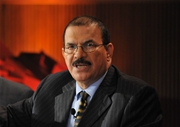
ABDULLA ALDERAZI
Thank you very much. Good evening ladies and gentlemen. A king who was courageous enough in 2001 to introduce a reform project, I believe that he has also courage enough now to introduce more reforms and the ability to have more reforms. The Bassiouni report: the BICI was invited by the King - which has happened for the first time ever in this region - to investigate freely, and they had free access and we met them several times - human rights societies, human rights organisations, government officials - and they have access to all files that they needed. Also they did the report and it was accepted. There were a lot of important recommendations in this report, which the King accepted and has started to practise and implement these recommendations. For example, they formed, let's say, the National Committee, which is recommendation No. 1715, to monitor and follow up the government agencies for the implementation of these recommendations. There are very important recommendations. For example, 1717 was related to making the Inspector General as an ombudsman office, to be independent from the Ministry of Interior and to receive complaints from the general public in order that they can complain and investigate all violations against human rights. In addition, also today the King in an interview with the BBC - he is in London now - said that he accepts and invites the opposition advisors to come as advisors to him, to monitor the recommendations and implementation of reform, and he said that it's a long-term project, it may take ten years in order to do so. A very important recommendation in the report is national reconciliation, which is 1725.
TIM SEBASTIAN
Okay, would you come to a close, please.
ABDULLA ALDERAZI
It's important because that's what the country needs now, is to look forward for the future: is what's happened, to review all the atrocities and to punish those who have committed crimes against humanity and move forward.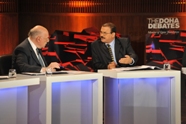 TIM SEBASTIAN
TIM SEBASTIAN
All right. Abdulla Alderazi, thank you very much indeed. Let me just take issue with you on one point. You said that the Commission got full access. The Commission said it didn't get full access - it got full access "most of the time". It's not the same thing at all. "We have had all the doors open to us. We were granted access to all the hospitals and prisons freely and without hindrance most of the time." That's a big reservation, isn't it?
ABDULLA ALDERAZI
Most of the time. Well, "most of the time" means more than..
TIM SEBASTIAN
Well, it means more than 50 percent. More than half is most of the time.
ABDULLA ALDERAZI
No, "most of the time" is almost 70 percent.
TIM SEBASTIAN
Okay. But what we're seeing at the moment - if you believe that the government wants to change and it's serious about reform - is them talking about the same things: prosecutors are still producing evidence in court that was discredited by the Commission, including the claims that there were guns at the Salmaniya Medical Complex - which the report rejected. That's still being talked about.
ABDULLA ALDERAZI
This is something that should be, for example, wrong done by the government. Medics case is the thorn now in the government throne. It has to be - they've had - that's why..
TIM SEBASTIAN
But they're still repeating it, aren't they? They're going on repeating discredited information.
ABDULLA ALDERAZI
That's why the National Committee is to work on these things. Now they've started on a recommendation..
TIM SEBASTIAN
But this isn't a reason to have faith in them, is it? It's going the wrong way.
ABDULLA ALDERAZI
No, the question is their ability, and their ability is there. Their ability started today, for example..
TIM SEBASTIAN
Yes, but it's not being exercised, is it? They're still talking about Iran as being part of it. That too was discredited by the report.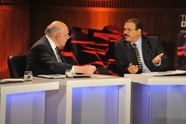 ABDULLA ALDERAZI
ABDULLA ALDERAZI
Yes, of course.
TIM SEBASTIAN
The report found no evidence of Iran's involvement.
ABDULLA ALDERAZI
The report found no evidence, and that was accepted. I know...
TIM SEBASTIA
So this goes on and on talking about the same discredited information.
ABDULLA ALDERAZI
I know that there are problems with the government, and they need radical change and also faces. We have to accept that.
TIM SEBASTIAN
But these are not encouraging signs, are they? They're not encouraging signs.
ABDULLA ALDERAZI
Encouraging signs, but it takes time. It will be, I'm sure, that once the Crown Prince, for example, who also is a serious person for reform, and..
TIM SEBASTIAN
It takes will, doesn't it, more than time?
ABDULLA ALDERAZI
Of course. Political will is important.
TIM SEBASTIAN
Which clearly isn't there, if these things are being repeated endlessly.
ABDULLA ALDERAZI
I think with the help of the world, with the help of the EU, with the support of different countries to push the reform forward.
TIM SEBASTIAN
What help? What help? What help do you want?
ABDULLA ALDERAZI
Well, all kind of technical things that government..
TIM SEBASTIAN
Government knows what it needs to do. What help does it need?
ABDULLA ALDERAZI
Of course it knows what to do. That's why what I mean is part of the National Committee is in order to guide and advise and push forward the government. Now we start, for example, with the recommendations..
TIM SEBASTIAN
It sounds like a lot of pushing. Abdulla Alderazi, we're going to take some questions now. Let me just remind the audience of the motion: ‘This House has no confidence in Bahrain's promise to reform.' We're going to take your questions now. So if you'd raise a hand, we'll get a microphone to you. There's a gentleman in the third row: we'll take you first, please.
Audience questions
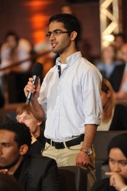 AUDIENCE (M)
AUDIENCE (M)
I'm from Saudi, but I've lived in Bahrain for the past eight years. And I have a question for Mr. Almaeena. You cited media awareness as a reason to have faith in reform. But don't you think that indicates that perhaps as soon as the international spotlight fades away from Bahrain the King might not be as prone to continue these supposed efforts toward reform? Thank you.
TIM SEBASTIAN
Khaled Almaeena.
KHALED ALMAEENA
Well, I think the official media has lost its principal stand. But what I'm saying is that the media should focus on and on and this is what's going to happen. You have to have a sustained way of 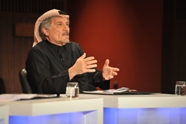 things. You cannot just leave Bahrain and go away the next time. And I think for even the people in Bahrain, and the government, reform is a survival diktat. Those who do not reform will be left by the wayside and this is a fact of life. So even if the media leaves, it's the people of Bahrain who have to get on with their own battle and the people of the GCC, and young people like you. So I don't think that any focusing off the situation in Bahrain is going to have the Bahraini government have a say in doing things that they shouldn't do. I
things. You cannot just leave Bahrain and go away the next time. And I think for even the people in Bahrain, and the government, reform is a survival diktat. Those who do not reform will be left by the wayside and this is a fact of life. So even if the media leaves, it's the people of Bahrain who have to get on with their own battle and the people of the GCC, and young people like you. So I don't think that any focusing off the situation in Bahrain is going to have the Bahraini government have a say in doing things that they shouldn't do. I 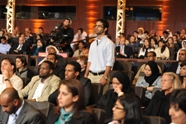 think they should ask for accountability, as the gentleman said. There are people who have been promoted, and I think there should be transparency on the part of the government.
think they should ask for accountability, as the gentleman said. There are people who have been promoted, and I think there should be transparency on the part of the government.
TIM SEBASTIAN
People promoted who shouldn't have been promoted?
KHALED ALMAEENA
Who shouldn't have been promoted. And I think for survival, for any government in the world, reform is a necessity. It's not an option or a choice. It is compulsory.
TIM SEBASTIAN (to questioner)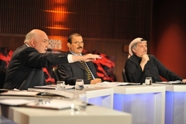 Do you want to come back on that? Go ahead.
Do you want to come back on that? Go ahead.
AUDIENCE (M)
So you said that there's a lot of importance focused on the effect that youth have on the situation. But as you mentioned previously, the youth, the most they can do is bring attention to the situation. And my point was that this situation will not be constant. As countries seem to change and I place emphasis on the word seem to change international attention fades away because people seem to think that the issues are being addressed. Whereas the fact that, for example, the Head of National Security seemed to be fired and then was actually hired as a personal advisor to the King, don't you think that seems a bit duplicitous on the government's side, in that it just wants to feign reform?
TIM SEBASTIAN
Okay, all right. Let him answer.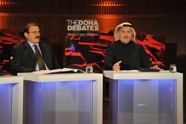 KHALED ALMAEENA
KHALED ALMAEENA
Yeah,and I think yes, I mean, there are people in authority who like to pull the wool over people's eyes. But take the case of Burma and this lady who kept on a sustained struggle. So I think this is what has got to be done. And we have to. As I said since I am against the motion, the King has come out, he has spoken, as I said, and released them. Even if it's cosmetic, I think we've got to take things at face value and keep on that line of negotiations without it turning into violence or bloody from either side.
TIM SEBASTIAN
Okay, so you think that they either reform or they're finished, the Bahraini royal family? Either reform or finished?
KHALED ALMAEENA
It is a matter of anyone, yes, they have to reform.
TIM SEBASTIAN
Okay. We'll take a question from the lady in the front row. 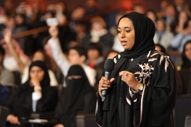 AUDIENCE (F)
AUDIENCE (F)
Thank you very much. I'm from Bahrain. My question is: isn't it very sad, Mr. Rajab, that during the past ten years the government has shown true initiative to put reform on track and in that phase will get stubborn people trying not to respond to that reform? For example, the opposition party is not participating, in the name of religion, in elections earlier in the middle of, I think 2002, and then 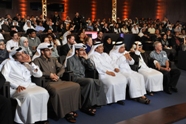 afterwards seizing that opportunity to get into the parliament and then trying to discredit the credibility of His Majesty the King.
afterwards seizing that opportunity to get into the parliament and then trying to discredit the credibility of His Majesty the King.
TIM SEBASTIAN
Okay, let him answer, then.
NABEEL RAJAB
Well, I didn't know about the opposition boycotting the election on the basis of religion - that's the first time I ever heard it. But the fact is that the King has promised the people to restore and to activate the constitution and the parliament that we had in the Seventies, but the King did not keep his promise. There was a reason for the opposition to boycott - because the King, and it's not the first time, promised reforms and when things cooled down the man goes back on all his promises. This was the actual problem.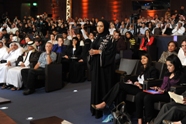 TIM SEBASTIAN (to questioner)
TIM SEBASTIAN (to questioner)
Okay, please come back there.
AUDIENCE (F)
Can I just follow up? That was not the question. The question is: why, assuming that the King is not fulfilling his promises - he'd just started ruling at that time, and he was true and very sincere in putting many reforms - I think it's very sad that we're overlooking the many reforms happening in the country. In the light of some accusations, I think many definitions of democracy in Bahrain have been overturned.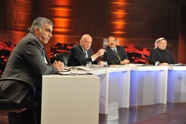 TIM SEBASTIAN (to questioner)
TIM SEBASTIAN (to questioner)
Okay, do you have a question, or do you want to make a speech?
AUDIENCE (F)
That is the question. Why the mistrust? Why assuming there is no..
NABEEL RAJAB
Well, I mean, saying that we didn't give him time. He came in in 1999. Today is 2011. Today we have one person in every thousand citizens as a political prisoner. So we have thousands of people kicked out of their jobs, targeted in their living. A tenth of mosques being demolished. A hospital being used as a torture centre. Doctors were arrested, tortured. People were tortured in the hospital and died. What kind of reform are you talking ab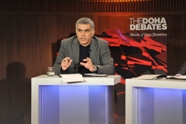 out? I enjoy listening to the King when he talks about reform. But when you come into the fact, the reality on the ground, it's totally different. You can't tell me there is a reform, and we have a Prime Minister who's been ruling there for the past 42 years.
out? I enjoy listening to the King when he talks about reform. But when you come into the fact, the reality on the ground, it's totally different. You can't tell me there is a reform, and we have a Prime Minister who's been ruling there for the past 42 years.
TIM SEBASTIAN
All right, let's let the questioner: briefly do you want to come back on that, just one brief word?
AUDIENCE (F)
Actually, yes. I believe if you're talking about mistrust, there are many other concepts of mistrust that are in this story. For example, yourself, Mr. Rajab. There is a video of you inciting young people in the streets, and you said the majority of the people in the Gulf are young people, inciting them to go ahead and burn and sabotage in order to deliver a human rights cause. Well, is that what a human rights activist is supposed to do - to get down on the streets and incite sabotage and destruction?
NABEEL RAJAB
I'll give you 2,000 dollars if you give me that video.
AUDIENCE (F)
Well, I have it. I do have it right here. I have it. [Audience applause]
TIM SEBASTIAN
Okay, we're going to move on. I'm going to take a question from the lady in white. Yes, you.
AUDIENCE (F)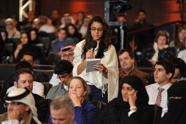 I have a question for Nabeel Rajab. You stated in your speech that the Bahraini people have been fighting for the same demand for the past 80 years: why hasn't anything happened since then? And also the Bahraini King signed a proclamation promising democracy and freedom in 2001. Why didn't any action take place by the Bahraini people or the UN when the people saw that such promises weren't being fulfilled?
I have a question for Nabeel Rajab. You stated in your speech that the Bahraini people have been fighting for the same demand for the past 80 years: why hasn't anything happened since then? And also the Bahraini King signed a proclamation promising democracy and freedom in 2001. Why didn't any action take place by the Bahraini people or the UN when the people saw that such promises weren't being fulfilled?
TIM SEBASTIAN
Okay, perhaps we'll get Christopher Davidson to have an answer on that one.
CHRISTOPHER DAVIDSON
So your question is that the promises have not been fulfilled?
AUDIENCE (F)
Yes, and why any action didn't take place since 2001.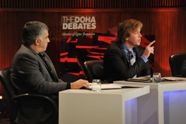 CHRISTOPHER DAVIDSON
CHRISTOPHER DAVIDSON
Well, I think if we look at, we could make this a history discussion of Bahrain if we wanted, but we've had cycles of ..
TIM SEBASTIAN
We don't. [Audience laughter]
CHRISTOPHER DAVIDSON
I don't either, really. But we've had cycles of violence, cycles of uprising, and time-buying mechanisms. I would argue that even the 2001 attempt to transform Bahrain into a constitutional monarchy was again a time-buying mechanism, as the Bassiouni report is too. The Bassiouni report has provided several months of a political shield for the Bahraini regime to survive a bit longer. In the same way, the constitutional monarchy that was created in 2001 for the last decade was used much for the same purpose.
TIM SEBASTIAN
Political shield, systematic torture - that's not much of a shield, is it?
CHRISTOPHER DAVIDSON
The systematic torture has gone on behind the political shield. It's been a great face-saving mechanism for the King for the last several months as the Arab Spring has taken hold elsewhere in the world. And I'm sure the meeting in London today was...
TIM SEBASTIAN
But isn't it known as a country that tortures and kills its people? I don't see that as a political shield.
CHRISTOPHER DAVIDSON
I think it's been enough of a political shield to keep many of the foreign powers off their back.
AUDIENCE (F)
Was it just to buy time or get a better reputation that the Bahraini government decided to bring this proclamation forward, bring such a promise to guarantee freedom to the Bahraini people?
CHRISTOPHER DAVIDSON
Well, I would be very surprised if the King's meeting with David Cameron today in London didn't make full discussion of the Bassiouni report. I'm sure it will be used as the main explanation and defence that Bahrain is actually moving forward somehow.
TIM SEBASTIAN
Khaled Almaeena, do you want to come in on this?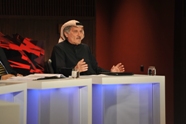 KHALED ALMAEENA
KHALED ALMAEENA
Well, I think, as I said, I mean, we have to give both sides a chance. I mean, the King has said it. A Commission has been initiated by the King. There have been some very respectable members in that Commission. So I really think we ought to give this peace process between the government and the people a chance to go ahead, while I do agree that those who have taken part in bloodshed should be taken to task and should be punished according to the law.
TIM SEBASTIAN (to questioner)
Do you want to have one last comment on this?
AUDIENCE (F)
Yes, please. Sir, your speech focused on the young people of Bahrain. But all this violence could be influencing them?
KHALED ALMAEENA
Well, I don't think it's influencing them. There are many ways. I mean, I have heard of Nabeel being accused of inciting people, but I don't think so. There are many ways to protest and to write and I don't think young people are being used; it's just an expression when people flow out and talk and go out on the streets.
TIM SEBASTIAN
Okay. I'm going to take a question from the lady in red.
AUDIENCE (F)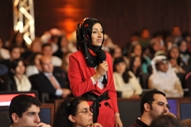
Hi. I'm from Bahrain and I was one of the youth activists who took part in the protests since February 14th. We partly did so because we no longer want to be treated as subjects; we want to be treated as equal citizens with full citizenship rights and a full constitutional system. In doing that, my husband was arrested in April. He's been in jail for eight months, just to silence activists like me. So I just want to..
TIM SEBASTIAN
Can we come to a question, please.
AUDIENCE (F)
My question to Abdulla Alderazi: you know there are 700 people in prison today, political prisoners in prison today - they're the ones that this report talks about. There was objective systematic torture. There has been no initiative to release them. The King has not promised to release them. My husband calls me and asks me, "Why am I still in jail and my torturer gets promoted?" Do you think I trust a government that spends more, spends millions on PR to appear to be good, to the West, instead of actually being good and actually promising reform? There isn't even a promise of reform. There's no promise of political reconciliation. [Audience applause]
TIM SEBASTIAN
Okay, let's allow Abdulla Alderazi to answer that.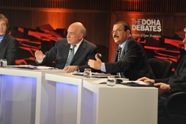 ABDULLA ALDERAZI
ABDULLA ALDERAZI
Of course holding people in prison and torture, nobody accepts that at all. That's a principle. The report has pointed out that..
AUDIENCE (F)
And how can you trust a government that does that and continues to do that?
ABDULLA ALDERAZI
Can I finish my answer please?
TIM SEBASTIAN
Please let him speak.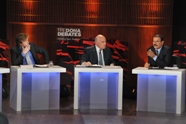 ABDULLA ALDERAZI
ABDULLA ALDERAZI
Can I finish my answer? Nobody, no human being will accept any mistreatment for what happened to those prisoners. As I said earlier in my opening speech about the medics, this applies to teachers, this applies to academics, this applies to all the society. Now, do we want to go forward for a better future for all Bahrainis or are we going to just talk and talk and talk? We have to take actions. If we want to take actions, we have to look at experiences in the world. South Africa, for example. South Africa has applied to national regulation..
TIM SEBASTIAN
Let's just stay with Bahrain, shall we. Let's just stay with Bahrain.
ABDULLA ALDERAZI
Morocco, Chile, Argentina, all the other places. Now..
AUDIENCE (F)
This is the Arab Spring. This is the Arab Spring.
ABDULLA ALDERAZI
Let me finish. Okay, let me finish. So, for example, I am with dropping all the charges, the government should really drop all the charges, should release all prisoners without discrimination, should reinstate everybody who lost their jobs and not just reinstated: to go back to their original job. Because, as we know, that we have contacted so many people on the Committee, because being on the National Committee they said they'd been reinstated back to their jobs, but for example, as a doctor, a head of a health clinic, he was just an ordinary doctor. So that's, so what I'm saying...
TIM SEBASTIAN (to questioner)
Okay, but do any of the things that you (points to Abdulla Alderazi) have said convince you?
AUDIENCE (F)
No, of course not, because there are more promises, there are more "should, should, should". Where's the action? Why doesn't he open the jails? We're living off a stroke of a pen of the King. We have to decide whether he wakes up and decides to release everyone in prison or he goes to bed deciding, "Well, not today. Maybe tomorrow." I don't want to live off a whim of a King that just decides to jail people, to torture people. And then what does he do? He promises more Commissions to look into this, which you're participating in, instead of actually doing the action. You know, there is no excuse for not doing any of this stuff.
TIM SEBASTIAN
Okay, all right. Let him answer you.
ABDULLA ALDERAZI
So you want the country to go forward or backward?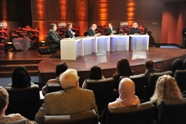 TIM SEBASTIAN
TIM SEBASTIAN
No, she wants people released from jail.
ABDULLA ALDERAZI
That's what I want too.
AUDIENCE (F)
I want justice. I want justice.
ABDULLA ALDERAZI
I want it too, myself.
TIM SEBASTIAN
So why hasn't it happened yet? You have faith in the King. Why isn't he releasing these people?
ABDULLA ALDERAZI
I'm sure it will happen. I'm sure it will happen soon.
TIM SEBASTIAN
When? When? When is "soon"?
ABDULLA ALDERAZI
That's the promise. Soon, because of the committee, our National Committee, it has been working on that. We started with the recommendation related to the reinstatement of the people back into work and this will be done within probably a week, ten days. And also..
AUDIENCE (F)
So you'll promising my husband will be out of jail in a week? He's been sentenced to three years in a military court.
ABDULLA ALDERAZI
I'm not... I said that there are serious reforms coming. There are serious people..
AUDIENCE (F)
You know something that the people of Bahrain do not know.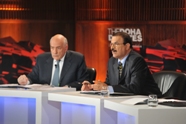 ABDULLA ALDERAZI
ABDULLA ALDERAZI
There are serious people who are in the government who want change, who want to go forward for the country, to have a better Bahrain of before 14th February. And this will need support from all of us.
TIM SEBASTIAN
Okay, all right. We've heard that point. I'm going to take a question from the gentleman at the back over there.
AUDIENCE (M)
Hi, I'm a South African journalist based in Qatar. And we've heard reports, allegations, rather, that even if Bahrain wanted to reform, Saudi Arabia would not allow it to happen. Any response? [Audience applause]
TIM SEBASTIAN
Khaled Almaeena, straight to your door.
KHALED ALMAEENA
Well, tomorrow if the lights go out in London, they'll blame Saudi Arabia. [Audience laughter] But I think this overhype of the Saudis interfering, I think by saying that you demean the government of Bahrain and the King of Bahrain and others. I mean, Bahrain is not a puppet; it has been in the forefront, it is a very active country. I doubt that. Because the Saudis themselves are reforming. If you see the last five, six years, Saudi Arabia a new, ten years ago, it's totally changed: with women coming in, or... I'm not saying that it's going with the speed that I would like for it to go, or with the young people.
TIM SEBASTIAN
Khaled, what's changed in Saudi Arabia?
KHALED ALMAEENA
Well, in the sense that there has been a great focus on the women's issues. The women now are going to go into parliament in the next session.
TIM SEBASTIAN
They still can't drive. [Audience laughter]
KHALED ALMAEENA
Another good question, and that..
TIM SEBASTIAN
Not that I want to go on about driving, but..
KHALED ALMAEENA
No, but this is again a campaign that should be decided by the women. And there are people who'd really like to go ahead. Some of them have been detained for a few days because they drove. But I think a lot of these root causes can be really, the solution lies with the people themselves. But I do believe that there has been some change.
TIM SEBASTIAN
Nabeel Rajab, do you want to come in here?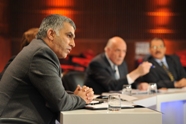 NABEEL RAJAB
NABEEL RAJAB
I think one of the most dangerous things in the Arab Spring or Arab revolution are the Saudis now. They're revolting back, [Audience applause] and they're fighting all the revolution, all the movement, all the democratic movement. And I think you as a youth movement around the Arab Spring, you have to be aware of that. They're either fighting the revolution or hijacking the revolution, as I could see an indication right now in Egypt. So I think they're the most dangerous partner that we have to deal with. I would still go back to the answer of the girl over here: Bahrain revolution - you have to know that the Bahrain revolution was the most peaceful revolution in the Arab region, that violence was not being used at all. That is what has been said by all the human rights groups and international organisations. [Audience applause] Number 2, why there was no reaction..
TIM SEBASTIAN
Just one more point and then I want Khaled Almaeena to answer those charges.
NABEEL RAJAB
One more. Why there is no reaction from the international community? You have to understand, we are in the Gulf countries and we are paying the price today for being in a rich region, influential region in the Western countries and United States government. That's why you have seen no reaction from the international community, from the Western governments, from the United States because Saudis are very influential in those countries. More crimes are being committed here and Bahrain have committed more crimes than other countries. Because they have fought their own people, not with their own army, but they invited other armies from neighbouring countries to kill their own people. [Audience applause]
TIM SEBASTIAN
Nabeel Rajab, thank you. I know you're building up. Thank you, but I want to get Khaled Almaeena to answer those charges about Saudi Arabia.
KHALED ALMAEENA
Well, you know, even the Saudis believe there can be no stability if the majority is dissatisfied. So if these actions are of dissatisfy people in the Gulf, then it's bad for Saudi Arabia too. And Nabeel, I don't think that they would go out and invite people, I mean, the GCC, the UAE and the Kuwaitis and all jumped at the drop of a hat and send their own people to Bahrain to patrol so that the so-called Iranian navy would not come in or help would come in. But I think we sort of overestimate and I am saying that with all the solemnity at my disposal, I mean, I don't think so, the Saudi role is always overmagnified about their interference. We have our own issues. We have three or four major issues: youth, the environment, the population, women's issues. I doubt that there are people sitting and plotting and taking a pen and saying: "Today we do this in Bahrain. Tomorrow we go to the UAE." We have our own problems.
TIM SEBASTIAN
The report didn't find any evidence of Saudi involvement in the abuses, did it?
NABEEL RAJAB
The fact that people fighting for democracy and social justice and you go and invite another army to come in, whether they were involved directly or indirectly, it's a shame that you send your troops to fight a peaceful protest. People have no arms, people have even no knives. That itself is bad, it's something that is going to be a black spot in the history of the GCC forces headed by the Saudis.
KHALED ALMAEENA
But Nabeel, it was not the Saudis who were invited; it was the whole GCC union, the region.
NABEEL RAJAB
It was the Saudis and the Emiratis. [Audience applause]
KHALED ALMAEENA
Well, I mean, now you added one more. You can add as many..
NABEEL RAJAB
...did.
KHALED ALMAEENA
Yes, but it was not the Saudis. As I said, believe you me, and I know, that there are no people plotting and saying, "Today we do this in Bahrain, or tomorrow we do that."
TIM SEBASTIAN
How do you know?
NABEEL RAJAB
The GCC forces made not go interfering in the internal politics of any country but to defend the external threat. And there was not a single external threat in Bahrain. And now Mr. Bassiouni said that there was no threat from Iran as they tried to present it. And as we've been victims of saying "Iran/Bahrain, Iran/Shias, Iran/Bahrain," they've been playing with these guys for many, many years and we are paying the price. So there was no external threat. There was no reason for the Saudis to come to Bahrain and to take part in the crackdown and killing the people. [Audience applause]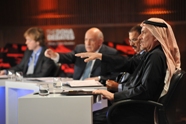 KHALED ALMAEENA
KHALED ALMAEENA
But let me put it this way. The other GCC countries would have flatly refused. As the UAE has not joined the economic union, the Omanis don't want a unified currency. So they could have said: "Look, Mr. Saudis, we don't want to go in with you. You go ahead." They could have said that.
TIM SEBASTIAN
Abdulla Alderazi, you wanted to make a point.
ABDULLA ALDERAZI
Well, I think of course the interference of the Jazeera shield was not acceptable by us at all, by Bahrainis. What is happening now, what I think, is that the policy of Saudi Arabia may have changed. For the stability of Bahrain is better for Saudi Arabia now. More reforms in Bahrain is better for the security and safety for Saudi Arabia now. Moving forward, for the new future in the region, it's better for Saudi Arabia now. They have their own problems. They have problems in al-Qateef, they have problems in Awwamiya, they have other problems in different parts of Saudi Arabia. So I think now things have changed: that Saudi probably, or most probably, they want a stable Bahrain.
TIM SEBASTIAN
Okay. Christopher Davidson.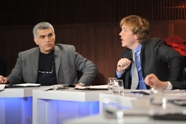 CHRISTOPHER DAVIDSON
CHRISTOPHER DAVIDSON
Well, I think with regard to the Saudi angle, Saudi Arabia is fast becoming the major counter-revolutionary force in the region. It's still a country with subsidies and some regional clout. I think Bahrain and elsewhere in the Gulf, where there have been protests and riots - Oman, for example, where there's been a Saudi aid rescue package - represent a real existential threat to Gulf monarchy. Saudi Arabia, United Arab Emirates to some extent, want to portray the Arab Spring as something connected to Arab republic authoritarianism and something that for some reason cannot take root in a traditional monarchy. Bahrain, of course, is a traditional monarchy, where the ruling family look and speak the same as the other Gulf monarchs, but of course it's now a resource-rich one. So a collapse of monarchy in Bahrain, I would argue, would seemingly break the spell or the illusion of invincibility of Gulf monarchy in the region.
TIM SEBASTIAN
Okay. I'm going to take a question from the gentleman in blue, in the front row. Could you tell us where you're from, please.
AUDIENCE (M)
Bahrain. My question to Mr. Rajab. Firstly, I want your definition for freedom of speech, since that's what the main opposition force want in Bahrain. Not just define the fact that people were tortured or were killed, innocent people were killed, but I want to know what your definition is. This is Number 1. Number 2..
TIM SEBASTIAN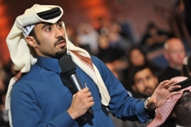
Well, let's start with that, shall we?
NABEEL RAJAB
That's not my job. It's been already defined in the International Convention. It's not me who should say. Article No. 19, the National Convention for Human Rights talks about it.
AUDIENCE (M)
Well, no. The fact is you have to understand that no matter how educated we are, this region is still quite tribal. And some people find it very offensive when you have pictures of ruling leaders from different tribes being trampled on and other pictures being put up from other political leaders around the world, let's say, from Lebanon or Iran.
TIM SEBASTIAN (to questioner)
So what is your point - is it that somehow that excuses the abuses that followed?
AUDIENCE (M)
No, it does not. It does not excuse the abuses. My question to him is I just want to know what are they looking for when it comes to freedom of speech? Because that's what they always say.
TIM SEBASTIAN
But they're looking, presumably, for what the report criticised, which was a lack of free speech and a lack of bias in the state media. That's presumably what they want, isn't it?
NABEEL RAJAB
Well, I mean, I can't define that because there is an international definition. It's in the International Convention for Human Rights. And we asked the government to stick to the international standard. And for your information, the report of Bassiouni said many people who are in jail today are on trial because of expressing their freedom of expression. But you assume that those people have been out, until today they are inside the jail. They were not even freed.
TIM SEBASTIAN
Okay. AUDIENCE (M)
AUDIENCE (M)
One last question. When you stated that this movement that happened, the uprising that happened in Bahrain, wasn't very violent: we've seen videos on YouTube of police officers being toppled by cars and students being beaten up in the University of Bahrain. And also citizens, both Sunni and Shiite, being killed at checkpoints, at different checkpoints which were made in different areas around Bahrain.
NABEEL RAJAB
Well, I mean, I will not deny that in each and every revolution there are isolated cases. But there is no policy by the protesters of using violence. Otherwise you would have seen many people killed. So far 50 people among the protesters in opposition were killed. Policemen, one or two. The government accused the protesters. They might have done that. It's wrong, it's a crime, people should be punished - no justification for killing, violating people's right of life. But this is still not a policy of violence. There are isolated [cases], there are crazy people among everywhere. But there is no policy of violence. All during the uprising, human rights groups were all in Bahrain. All international journalists were present in Bahrain. All of them speak in all the biggest newspapers that the Bahrain revolution is the most peaceful one.
TIM SEBASTIAN
Okay. I'm going to take a question from the lady in the third row there.
AUDIENCE (F)
I'm from Bahrain, and when I was in school in Bahrain we had students put up posters quoting the King's son saying: "Whoever called for the fall of the government, I call for a wall to be fallen over their heads." That basically insinuates that there are parts of the royal family that do not accept reform and do not accept the protests in general. Therefore how can you have confidence in reform and in the King's acceptance of reform if the royal family itself is not supportive of it?
TIM SEBASTIAN
Abdulla Alderazi.
ABDULLA ALDERAZI
Our fingers are not the same, right. Everyone in the world, in any place, in any movement, in any royal family, even in any political party, they differ in their views. There are the hardliners, there are the reformers, there are the ones that they want to probe, but the thing is that you can find these cases everywhere. The idea behind is that there is now an opportunity. There is the BICI report, there is the National Committee, there are other things, and there are people in the government who are willing to move forward. We can rely on these. Of course there will be obstacles, of course there will be problems, of course there will be other things, but we have to push for the future of Bahrain. We have to push forward.
TIM SEBASTIAN (to questioner)
Okay. I want you to come back on that, will you?
AUDIENCE (F)
I actually don't buy that, because I've seen people who got shot, people were suffocating from tear gas. Aside from that, people were actually approaching the military trying to defend themselves who were holding leaves of palmtrees, saying: "This is my only defence." How can you say that there is going to be reform if the government allowed violence to take place in Bahrain and the government just sat back and watched people die, its own civilians die, the whole time, and set an example to the youth today?
TIM SEBASTIAN
Okay. Do you want to come back on that?
ABDULLA ALDERAZI
Yes. I understand all this. This is wrong, completely wrong. I disagree with any violence, any of the killing of protesters, any violence of using excessive force. This is wrong, as I said. What I'm saying is that there is an ability, there are signs that we can move forward, there are signs that the government, or part of the government, or part of the royal family - I'm not saying everybody, as I said - are willing to move forward. So our role..
TIM SEBASTIAN
But they haven't been the ones who've been willing, have they, in the past? They haven't been the ones who've been willing.
ABDULLA ALDERAZI
Our role is to support this. Our role is to push forward, that we support them in order to make them stronger.
TIM SEBASTIAN
Okay. Christopher Davidson.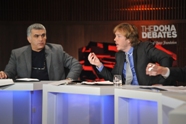 CHRISTOPHER DAVIDSON
CHRISTOPHER DAVIDSON
Just a quick comment on this. We also need to ask ourselves who's actually been committing the violence in Bahrain over the last several months. I remember back in February, literally February 15th or 16th, seeing these newspaper adverts in Pakistan advertising for basically mercenaries to come and join the Bahraini security services. Plus, of course, we've got the issue of the large number of naturalised Bahrainis in recent years. I looked at the population statistics just the other night on the plane. If we look at even the most favourable birth rates in Bahrain of the indigenous population over the last decade, it's impossible to get from A to B with how the population's grown. And I believe many have actually entered the security services, which makes absolute sense given that they have loyalty to the regime that's employed them and offered them citizenship. So I wonder for Bahraini people facing this violence over the last several months what it must feel like to have obvious foreigners actually wielding the tear gas canisters and shooting their weapons at you.
AUDIENCE (F)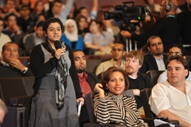
Personally I have actually seen people, like foreigners, get attacked because of this. Because it's like you have someone who's not a citizen of your own country try to praise the royal family. I've seen posters being put up saying that the royal family has a divine right to be in control, to be in the position it is today.
TIM SEBASTIAN
Okay. Khaled Almaeena, this question of divine right keeps coming up. Do they have a divine right to rule? You would say they don't now if they don't perform.
KHALED ALMAEENA
No. Well, I don't think that anybody has a divine right. I mean, even prophets don't have a divine right to rule. The Holy Prophet did not have a son and, you know, if God wanted his successors to rule, he would have given him a son. But I do believe that - I personally believe, I mean, in the case of Saudi Arabia - and I've said, and don't get me wrong: I'm one of those people who is an advocate of free speech, people participation, especially young people, who I work a lot with - but at times there has to be a focal point. Now, there are problems in the political parties, but I believe - if I take Saudi Arabia as an example: I think the monarchy in Saudi Arabia is the focal point. I'm not talking about divine rights. But we need reforms, we need to have face-to-face talks, we have to have people participation. The age of slavery is finished.
TIM SEBASTIAN
Okay, all right. The gentleman in the front row. We'll take a question from you, please.
AUDIENCE (M)
Hello. I'm from Qatar. And my question's for Mr. Abdulla. So first, you exhibit your disagreement with the violation and the abuse of the protesters and then you went on about how the government made promises to reform. And my question is: don't you think that before the government makes these promises they should start by stopping these violations?
ABDULLA ALDERAZI
Okay. Of course they should. I agree with you that..
AUDIENCE (M)
Did they?
ABDULLA ALDERAZI
Pardon, let me finish. I want to finish that. Of course they do. Unfortunately it's still going on. And that is what exactly I mean, that the report itself mentioned this things. And the recommendations related to those who are responsible for torture, for use of excessive force and so on should be made accountable. Even recommendation 1720, which is related to review - and that's the job of the National Committee - review all the conventions that were sentenced by the National Security Court. And if they contradict with international standards of fair trials or not and to review them; and if they are, they should be abolished.
TIM SEBASTIAN (to questioner)
Does that impress you?
AUDIENCE (M)
Well, not really, because so far, for me, he had said that these people who are not punished who are responsible for this and the killings are still going on, or the violations are still going on. So the government already commenced with promises and reformations, but they should stop this first so they could gain the credibility of the people, so that people can believe them.
ABDULLA ALDERAZI
I agree. I completely agree with you, they should stop it. They should stop any form of use of excessive force against the protesters. They should.
TIM SEBASTIAN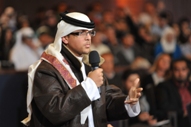
Isn't the reason that they don't stop it is they have no intention of stopping it?
ABDULLA ALDERAZI
"Royal attention"?
TIM SEBASTIAN
They have no intention of..
ABDULLA ALDERAZI
"No intention". I don't think they have no intention. There is intention, there is faith that there will be reforms. And such violence is not acceptable by any means by anybody. And that's important.
TIM SEBASTIAN
Okay. Nabeel Rajab.
NABEEL RAJAB
Yes, I mean, that's why I said don't focus on what was written in the report, but what's been practised. At least 10 people have died so far since the Bassiouni Commission work on Bahrain. Last night one child five days old was killed by tear gas. I was speaking in a seminar two nights ago in Bahrain, and half an hour later my house was fired with tear gas. And I'm urging you to go to YouTube and see how my house has been targeted. The problem is that, as the colleague said, yes, there are members of the ruling family committing the crimes. This is the problem. That's why again, I'm coming to the previous question, that's why the king brought the Commissioner to make the report and not the United Nations. [inaudible].... who were committing torture with their own hands.
TIM SEBASTIAN
Okay, let him make one more point.
AUDIENCE (M)
On your last comment, I think that before we start commencing with the promises and reformations, if you want to start a true reformation, if you want to gain the credibility of the people so they can believe us, I think that we should start by stopping these violations.
ABDULLA ALDERAZI
I agree with you, we should stop the crime first.
TIM SEBASTIAN
Okay, you made that... All right, the gentleman up there.
AUDIENCE (M)
Hi, I'm from Saudi Arabia, living in Bahrain. And my question is for Mr. Nabeel Rajab. I just want to know what exactly is it that the opposition wants at this point. Because I walk out of my house and I see protesters yelling, "Death to Al-Khalifa, down with Al-Khalifa." And I walk into the street and I see them throwing burning tyres and oil in the street and all of this commotion. I do see violence. You say violence doesn't exist: I see violence all the time on the side of the protesters.
TIM SEBASTIAN
Okay, you've made the point. Let him answer that. [Audience applause]
NABEEL RAJAB
I mean, don't take my opinion, but take the opinion of all the international human rights organisations who've talked about the revolution and said it's the most violent. I think 14th February people came out revolting, they were not trying to overthrow the regime; they were saying that we want elected government, we want parliament that has power, we want to have an end to the sectarian discrimination, we want to have an end to the corruption, we want the Prime Minister to step down. There is no civilised country that has a prime minister for 42 years. I mean, you cannot believe it. How can you reform when you cannot remove the Prime Minister and have another one? How can you reform? This is what I'm saying. And this is a very legitimate right that people are fighting for, guaranteed by all international conventions. There is nothing strange. People are calling for the same thing most of you have in your own countries - freedom, liberty, social justice, democracy, our right to fight and our right to have democracy and our right to live in justice. That's all that we want. Nothing else.
TIM SEBASTIAN
Okay. Abdulla Alderazi, do you want to come in on this?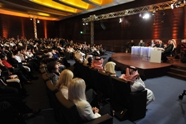 ABDULLA ALDERAZI
ABDULLA ALDERAZI
Well, you know, nobody is with violence that comes from any person, either from the side of the protesters or from the side of the police. And if protesters have always - and I experienced with you personally and so on - most of the time they are peaceful. Most of the time they are peaceful. There are, of course, incidents as unpeaceful probably or as theirs, but it doesn't come to the violence as really the international, let's say, definition of it. So there are no, for example, machine guns, weapons, no, there's nothing like that at all.
TIM SEBASTIAN
Okay. Nabeel Rajab raised a specific point about the Prime Minister: 42 years. This doesn't happen, he says, in a civilised country. Should the Prime Minister go? Is this what you'll recommend?
ABDULLA ALDERAZI
I believe yes.
TIM SEBASTIAN
He should go?
ABDULLA ALDERAZI
I believe yes. [Audience applause] I believe it's time that the people should have, if there are serious reforms going on, if there is serious reform for the future, there should be an appointed government.
TIM SEBASTIAN
And has the King got the will and the power to dismiss him?
ABDULLA ALDERAZI
You can ask him yourself.
TIM SEBASTIAN
What do you think? I'm asking you - you're on the Commission. What do you think?
KHALED ALMAEENA
He can.
ABDULLA ALDERAZI
Well, I think there is a possibility that this may happen. And I think for future change..
TIM SEBASTIAN
That doesn't sound very certain, does it?
ABDULLA ALDERAZI
For the future of Bahrain, for a better future, it may happen.
TIM SEBASTIAN
You don't sound very certain of it. Do you want to come back on what you heard from Nabeel Rajab about what the opposition wants?
AUDIENCE (M)
Yes. I just want to add that, so they have started somewhere. I mean, the government has started. There has been the opportunity for national dialogue, which many of the protesters, I think, of the political parties have rejected. And then in the Commission we've seen that there have been funds for repairing the damage that was caused. There is a committee working on rebuilding the places of worship. There are currently six cases in which police officers are being prosecuted after what's happened. So there are changes. It is happening.
TIM SEBASTIAN
Okay. Chris Davidson. Let's bring Chris Davidson in on this.
CHRISTOPHER DAVIDSON
Yes, just two quick points. As I mentioned at the beginning, we have to ask ourselves why the protesters are now saying "Down with al-Khalifa". The protests back in February didn't start like that; they started as genuine efforts to try and get already promised reforms being enacted that were a decade late. So we have to ask ourselves why the protesters have gotten as far as this. And clearly it's the repression, it's the collective punishment of Shia, it's the destruction of their Shia mosques as outlined in the Bassiouni report, etc. The other thing I think we need to be a little careful about, the opposition in particular, is that if the Prime Minister is removed now after 40 years, that alone cannot be regarded as a victory: that could well be the regime's face-saving mechanism. We've seen this in Kuwait with the dismissal of, well, the pre-emptive dismissal of Sheikh Nasser recently; perhaps even in Egypt as well, from Mubarak's removal in the face of a military junta. So we have to be very careful viewing the removal of one man as being the end of a particular regime.
TIM SEBASTIAN
Okay. Yes, Abdulla.
ABDULLA ALDERAZI
This is a matter of not one man or two men and so on. It's a matter of the whole system. A system of change has to happen. A person can be in such a position for this period of time, but there has to be a system. There has to be a whole..
TIM SEBASTIAN
Yes, but it's people who run this system. It doesn't just happen by itself, does it?
ABDULLA ALDERAZI
Of course there are people. But what I'm saying is that if there is the law and the system that goes on... For example, now today the leader of..
TIM SEBASTIAN
Laws are violated. The Commission report is full of laws that have been violated.
ABDULLA ALDERAZI
In a BBC interview today, the leader of Al Wefaq, the biggest political society in Bahrain, said he is not with the notion of al-Khalifa to go or the royal family. He said that. So it means that there is willingness of sitting for a serious dialogue for a national reconciliation for a better Bahrain for the future for everybody.
TIM SEBASTIAN
All right, okay.
NABEEL RAJAB
Since it's my question, I'm going to answer that. [Audience laughter]
TIM SEBASTIAN
Briefly. He answered it for you.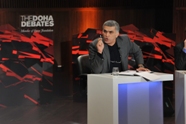 NABEEL RAJAB
NABEEL RAJAB
Brief. When you talked about funds and Tim earlier talked about funds, the King talked a couple of times about funds - it's not a business. It's human beings, 50 people who were killed. Responsibility, accountability. It's not about money. It's not about you buy people land. It's about people responsible need to be brought to justice. Those criminals, we have to name them and shame them. They're criminal and they need to be brought for justice. It's not about money, Number 1. Number 2, since you talked about the dialogue: yes, we support the dialogue and we call for a dialogue, but not a dialogue called by one party: it shouldn't be decided by one party; timeframe shouldn't be decided by one party but by all parties. [Audience applause]
TIM SEBASTIAN
Okay. Nabeel Rajab, we got you. Thank you. Lady in the second row.
AUDIENCE (F)
Thank you. I'm actually one of the nationals. I'm African but Bahraini national. And I believe that Bahrain has done some reforms in the last few weeks. Basically the reform in the state of a police academy, so they've done the changes by hiring one of the Scotland Yard specialists to come in and trying to mandate that. Secondly, they've also tried to investigate the dismissal of employees or staff, if it's in Alba or in the hospitals and schools. They're looking into it and they've hired a committee to look into this matter. So they've actually reinstating some of the teachers and doctors into their fields.
TIM SEBASTIAN
Okay, all right. Let me just ask Chris Davidson to respond to that.
CHRISTOPHER DAVIDSON
Well, as you know, Bahrain has a long history of employing military and security British advisors. We go back to the 1920s - Major Daly, Charles Belgrave, in the 50s, and of course Ian Henderson, who famously put down the Mau Mau rebellion was used in the 1990s and, I believe, still lives in Bahrain. So just because we have a Sir or a Lord etc. brought in to reform Bahrain's police and security services, I take that with a pinch of salt.
AUDIENCE (F)
No, it's not an assault [sic], because you need to have people who are trained, or are able to, capable to train.
NABEEL RAJAB
Our problem is not training; it's a policy of committing torture. The government tried to mislead the public opinion by bringing somebody from the United States and somebody from the UK. And by the way, both of them have a bad record in human rights organisations. [Audience applause] It's not that, it's not the training. It's the policy of torture.
AUDIENCE (F)
Okay. Nabeel. Do you have evidence for that, sir? (What?) Do you have evidence for that?
NABEEL RAJAB
Google tonight, you'll see that. [Audience laughter] 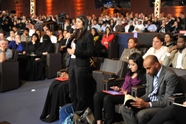 AUDIENCE (F)
AUDIENCE (F)
I will Google. Because I don't think so. Because obviously they're not here to respond to this, so I cannot respond on their behalf. But I believe that any person has the right to, as you say, as human rights to express their feelings. But again, what is the definition of human rights in your perspective, in our perspective and in those of the alliance of the Universal Declaration of Human Rights. But in Bahrain people do not seem to understand, or they might accelerate to a different extent, which could be crime or could be probably, as you say, torture. But in our case it cannot be torture as in the way that you're talking about. If it was torture, then what about the other side? You see, you're all talking about the opposition: what about the other citizens, like myself?
NABEEL RAJAB
The government Commission was saying that, not me. The Commission was formed by the government. And all human rights organisations. Not me.
AUDIENCE (F)
Myself, I was prevented..
TIM SEBASTIAN
Don't you accept the Commission's findings?
AUDIENCE (F)
I do accept, there's no question about it. But I do accept..
NABEEL RAJAB
And we just ask for the implementation of that report.
AUDIENCE (F)
But I do accept that the Commission also said, it didn't mention about the PM, didn't mention about the Prime Minister to go. It hasn't mentioned. So that is something that we also have to pay.
NABEEL RAJAB
It's not a political report. It's a human rights report, not a political.
AUDIENCE (F)
We need to do reforms. I have no question about we need to do reforms. I believe in the reforms, that's why I'm here, because we have to discuss it. Because we're all citizens here and we need, we're some citizens here to look at it. My question is: we have to work together, because if we don't work together, we keep on criticising each other.
TIM SEBASTIAN
That's a statement, that's not a question.
NABEEL RAJAB
I agree with you. [Audience applause]
TIM SEBASTIAN
Khaled Almaeena, do you want to come in on this?
KHALED ALMAEENA
Well, the Commission was headed by an international figure. The people are very respectable. So I think we've got to go... I do agree with you. But getting people from outside to come and train a police force does not mean that they will to train them to be better traffic policemen; they could be training them in the art of torture. So I do agree, but I am with you: there should be meetings of the mind between the government and the opposition, but I think it should be out more in the open, the media should focus, and both sides should come to the meeting table. But what I see from some of the people is putting the blame on the opposition totally, I think is also wrong. I'm sure there are several skeletons in the cupboard of the people and of the government, and also these things should 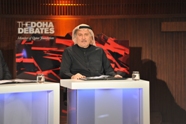 come to light. There are cases of people being killed. The Commission has said there have been tortures. And while we're talking on excessive force, I think somebody should enlighten me: what is the definition of excessive force - is it seven rounds from a machine gun or five rounds or whatever it is? So I think we have to come to terms with that too.
come to light. There are cases of people being killed. The Commission has said there have been tortures. And while we're talking on excessive force, I think somebody should enlighten me: what is the definition of excessive force - is it seven rounds from a machine gun or five rounds or whatever it is? So I think we have to come to terms with that too.
TIM SEBASTIAN
Okay. Lady in the first row.
AUDIENCE (F)
My question's for Mr. Nabeel Rajab. All I've seen daily is you attacking and attacking on Twitter, and so bluntly I'm going to ask this: do you really want to move forward? Because while we in Bahrain are trying to move forward, you seem to be dwelling on the past. [Audience applause]
NABEEL RAJAB
Well, I'm a human rights..
TIM SEBASTIAN ( to questioner)
You're from Bahrain?
AUDIENCE (F)
I am from Bahrain, yes.
NABEEL RAJAB
Well, I am not a diplomat. I am not an ambassador. I am a human rights activist. And my job is to find violators and shout at them and say "Please stop those crimes."
AUDIENCE (F)
Okay, there you go, you say you are a human rights activist. But where were you denouncing all of the violence committed, especially by the protesters when they ethnically selected their victims? The Pakistani ones. [Audience applause] And again, how can I trust you? This is a motion to trust the government, if we can't trust the government. I can't trust you as a human rights activist, so I have no trust in you either. [Audience applause]
NABEEL RAJAB
Can you repeat your question, because I didn't get it.
AUDIENCE (F)
I'm saying ...
TIM SEBASTIAN
Excuse me, you raised the question. Let him answer. Let him answer.
AUDIENCE (F)
He told me to repeat the question.
NABEEL RAJAB
No, I mean, I didn't understand what was your question. Pakistanis or something, you said.
AUDIENCE (F)
No, my question is: how can I trust you as a human rights activist when you're not denouncing what the protesters have been doing - ethnically killing their victims. I'm talking about the Pakistani nationals, the guest workers.
NABEEL RAJAB
Well, for your information, there are a couple of Pakistani workers and we, the Bahrain Center for Human Rights, we issued several statements on that. Again, second thing, it's the role of the state, it's the role of the government, it's the role of the police, to find those responsible and bring them to justice. And as they did so, it's finished - we don't have to talk about it. Now we have to talk about the crimes where people were not brought to justice. Now according to the government those people who committed a crime are already in jail now. So we can't blame now the government, because government did that - put them in jail. And we criticised that in a statement. But now who are those killers who are not in jail - are those people who killed 50 people so far, who tortured thousands of people, raped, electrocution and pulling and beating, slapping..
AUDIENCE (F)
I get your point. But the problem is you are against the courts of Bahrain. So now you want the courts of Bahrain to take..
NABEEL RAJAB
I'm against..
AUDIENCE (F)
Let me finish. You want the courts of Bahrain to action now? You were completely against it. So you're going back and forth. You cannot pick and choose. This is the way you do other.. [Audience applause]
NABEEL RAJAB
I'm not against the courts of Bahrain, I'm against unfair trial. I'm against unfair trial - trial that does not meet international standards. The report said most of the people who were on trial, this is not my own report, this is a government Commission report, said those people who were on trial, they were tried in a court that does not meet Bahraini law, does not meet the Bahraini constitution, does not meet the international standards. So I have to criticise that. The government report is criticising that, not only... I'm not just saying again it's the courts, of course not. If they come with fair ruling, I'm with that. But I mean, first of all you have to know we don't have an independent judiciary. You have to go to see all the human rights, including the report of the United States government, which is our ally, my government's ally. First thing in their human rights report they said: "The court in Bahrain is not independent. Headed by the King. The deputy is his cousin. The Minister of Justice is another cousin. Most of the judges who are taking those human rights defenders and politicians - they are from the same family. They are from the ruling family, who is part of the problem. How can you bring somebody who part of a problem to rule in cases of people trying to overthrow this family? [Audience applause]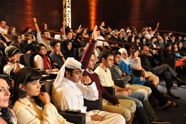 TIM SEBASTIAN
TIM SEBASTIAN
Okay, all right. Okay, I'm going to take one more question for this side of the argument (points to side argung against the motion). Who has a question for this side?
ABDULLA ALDERAZI
Nobody.
TIM SEBASTIAN
Yes, they do. Gentleman in the front row. Your question is for this side, against the motion.
AUDIENCE (M)
I'm from Bahrain. It's a question for Mr. Alderazi. It seems like we have two governments in Bahrain. Here we have a report condemning the government and have specific actions to be taken. It's been a few weeks, nothing has been done. Yes, there are a few things that have been done - which is good; I'm not arguing with that. On the second point, if we walk in the street today and I'm reading, I'm seeing online there's a lot of activities. The same activities from the government and also from the other side are happening on the street today. So who's ruling, who's in charge here? That's the question.
ABDULLA ALDERAZI
Who's in charge? I think the King is in charge.
AUDIENCE (M)
I don't think so.
ABDULLA ALDERAZI
I think the King is in charge. And the Crown Prince is in charge.
TIM SEBASTIAN
And your evidence for saying that is what?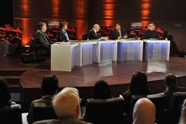 ABDULLA ALDERAZI
ABDULLA ALDERAZI
My evidence is that he's the head of the state. He's the one who is in London..
TIM SEBASTIAN
He's still occupying a chair. What's he doing?
ABDULLA ALDERAZI
Who is in London meeting Cameron today.
AUDIENCE (M)
We know about his locations.
ABDULLA ALDERAZI
Listen: as I said earlier, I mean, there are in any government, in any political party, in any royal family, there are people who differ. In the same family, sometimes you have two boys - you love one more than the other? No way. And they differ sometimes; I mean, not all the time. So there is a problem. What I said is that the most important thing is that we have to have a lawful state, that no discrimination - that's the future. Everybody is equal: either comes from the royal family or comes from an ordinary person or from the layman from the street, they should have in front of the law, they should be the same. There is no discrimination.
TIM SEBASTIAN
Let him come back.
AUDIENCE (M)
I totally agree with you on that. I mean, we all believe in that. What I also see: we have a Commission on your table right now that needs to be addressed. Action needs to be taken, so her husband and everyone else... I can believe in that. There's people in this room who were fired. What of the thousands..?
ABDULLA ALDERAZI
I was fired for eight months.
AUDIENCE (M)
You were fired too, as far as I know. I mean, actions need to be taken.
ABDULLA ALDERAZI
I'm an optimistic person.
AUDIENCE (M)
I mean, your talking about all this "family and all loving, loving" - no. We need to take actions...
ABDULLA ALDERAZI
I lost my job for eight months as a lecturer at the University of Bahrain, because as Secretary General for Human Rights we were participating..
AUDIENCE (M)
Because of your voice.
ABDULLA ALDERAZI
And going to the Pearl Square [Roundabout] and so on. So do I have to sit and cry? Do I have to sit and say, "This will never happen. This is always bad." [Audience applause] Or do I have to go and fight, and fight forward?
TIM SEBASTIAN
I'm going to ask the questioner whether..
ABDULLA ALDERAZI
You know, the water is spilled.
TIM SEBASTIAN (to questioner)
Just the question that you raised about living in a lawful state. Do you live in a lawful state in Bahrain?
AUDIENCE (M)
No.
ABDULLA ALDERAZI
At the moment, no, I agree with you.
AUDIENCE (M)
No. Let's be realistic. Since 2001, no. There's a lot of talks, left or right. Reality: the crisis has shown that, that we definitely never lived in the last 15 months or so - and God knows how long it's going to take.
TIM SEBASTIAN (to questioner)
What would convince you that the government is serious about reforming?
AUDIENCE (M)
Take what we have in the report today, take actions, do the recommendations as of tomorrow, okay and then I think the opposition and everyone else will sit down and listen. So some indication that you or the government at least have the intention to take actions. What we're seeing today, we have a report, a lot of talks, we have a committee that you're part of, but we also see a lot of actions concerning this in the street hitting people. And that does happen.
ABDULLA ALDERAZI
And this is the test now. I agree with you. What you said is that we have to move forward and implement what is in the report. Now there is a National Committee. I'm not saying that it has a magic wand - no. But at least you're trying. You'd better be in it than out of it. In order to win it, you have to be in it.
TIM SEBASTIAN
Khaled Almaeena, let me bring you in here. A government has to earn trust, doesn't it?
KHALED ALMAEENA
It's got to work hard to earn that trust because of what happened in the past.
TIM SEBASTIAN
So you don't think it's earned it yet, do you?
KHALED ALMAEENA
It's not earned it because the journey hasn't even commenced with this report. And as the gentleman said, I mean, they have to start implementing. Enough talk is going on. And some of the people clap 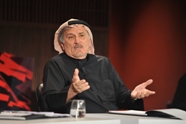 when something is said against Nabeel, but I don't think so. I think there's a genuine grievance in Bahrain, in other Arab countries, in GCC countries, and there should be a dialogue, a straight dialogue on an equal and level playing field.
when something is said against Nabeel, but I don't think so. I think there's a genuine grievance in Bahrain, in other Arab countries, in GCC countries, and there should be a dialogue, a straight dialogue on an equal and level playing field.
TIM SEBASTIAN
But you have confidence in Bahrain's promise to reform, even though you don't think they've earned the trust of the people?
KHALED ALMAEENA
Yes, reform is survival. Reform is an ongoing process. It's not, as I said earlier, an analgesic. I mean, they have to go ahead, because you can't keep the whole country in turbulence with what's going on. I mean, it's harming people, it's killing innocent people, five-day-old kids are being killed, suffocated. So there's no alternative to reforms.
TIM SEBASTIAN
Okay. Gentleman in the third row you've had your hand up for a long time.
AUDIENCE (M)
Hi. I'm from Bahrain. Well, my question is a general one on the topic to the panel. In the report it said that much of what happened was because of the mistrust between the government and the opposition. There was a trust deficit. Now, the topic here is about confidence. I for one am confident about the government's promises on reform. Why? Because since the beginning there were initiatives. You know, call them face-savings, but..
TIM SEBASTIAN
Okay, but come to a question, please.
AUDIENCE (M)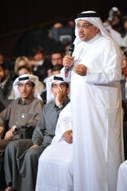
I do have a question. You know, do you think that this is not enough? I mean, do you think that with the national dialogue, the report, the..
TIM SEBASTIAN
I think they've answered that question.
AUDIENCE (M)
No, no, no, no, no.
TIM SEBASTIAN
I mean, we know what they think. They don't think it's enough.
AUDIENCE (M)
Yeah, but see it in context. I mean, the report itself said that the opposition would have gained a lot of gains, a lot of constitutional reforms had it gone into the dialogue, had it accepted it. You know, do you not see value in engagement? Do you not see value in at least giving it a go?
TIM SEBASTIAN
Okay. Nabeel Rajab, answer what..
NABEEL RAJAB
I believe in dialogue. I think they should sit together, opposition and government, but I don't trust the government could do that and have the willingness to do that, neither the King nor the Prime Minister. I think that dialogue is the solution for a political crisis and not the army, not inviting the Saudis, not killing the people, but a political crisis needs a political solution. They have to sit..
TIM SEBASTIAN
Why does the opposition choose not to sit on this Commission which Abdulla...?
NABEEL RAJAB
I think the opposition has a political problem with the government. You can't pick and choose who come in here.
TIM SEBASTIAN
Well, you are picking and choosing.
NABEEL RAJAB
First you have to solve your political problem with the opposition. You can't just bring them. You can't tomorrow create a dialogue. The opposition, for your information, hold at present 70 percent of the votes.
TIM SEBASTIAN
And what signal does it send - the government offers an olive branch and you turn it down?
NABEEL RAJAB
Holds presently 70 percent of the vote. The more you have a dialogue and you give them five or three percent of the seats - come on, that's not fair. They both have to decide, they all have to decide. Decision-making has to be made by people and by government.
TIM SEBASTIAN
Okay, let's go back to the questioner.
AUDIENCE (M)
Well, no, I think he's answered sufficiently. But I have one comment on that. In a situation where there is a trust deficit, it takes courage to take steps forward. And we've seen the government at least take some, even with the report. Call it face-saving or not, it's acknowledgement, accountability and, you know, it has taken action. We haven't seen anything of the opposition yet.
TIM SEBASTIAN
Okay, all right. Okay, you've made your comment. Thank you very much. I'd like to take a question from somewhere else in the Gulf, from Qatar, Kuwait, perhaps, a non-Bahraini. Libya, Tunisia, Egypt. All right - gentleman there in the front row. You are from..?
AUDIENCE (M)
Thank you. Tunisia, okay, at last. [Audience laughter] My question to the honourable gentlemen on the proposition side is: first, within the context of the Arab Spring uprisings and the overthrow of the dictators one after the other, time has been a very crucial factor. There is a time in this conjuncture where the leader has to grab the moment, and if he misses that he's done. According to you, how much time does the Bahraini King enjoy? And do you think he has already run out of time and that his days are just being counted?
TIM SEBASTIAN
Okay. Chris Davidson.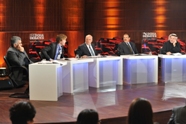 CHRISTOPHER DAVIDSON
CHRISTOPHER DAVIDSON
Well, I think in the case of Bahrain the King has demonstrated remarkable resilience. He's used a range of measures over the last several months which are unprecedented in the Gulf, including inviting foreign troops onto your soil, having an independent Commission into human rights, etc. I still see this as crack-covering reforms to buy more time. What makes Bahrain so different is not only that it's taken these measures, it's managed to identify that moment and survive the crucial one back in March, but also that its geopolitical situation surrounded by other Gulf monarchies that do not want to let it fall, plus of course its proximity to Iran and some of the major oilfields mean we're not going to get the same kind of international condemnation of the Bahraini regime any time soon, nor the same pressure to intervene and pose sanctions etc. no matter what the Bahraini regime actually does. And as we've discussed at length, the per capita violence in Bahrain is probably much higher than in Tunisia, Egypt etc.
TIM SEBASTIAN
Okay. Khaled Almaeena, how long does the King have, do you think?
KHALED ALMAEENA
I'm not an astrologer, I'm afraid.
TIM SEBASTIAN
No, no, I mean what are we talking about - weeks, months, a year?
KHALED ALMAEENA
No, I think, as I said, it all depends on what the Bahraini authorities do. I truly believe it is..
TIM SEBASTIAN
Yes, but how long have they got to do it in? How urgent is it?
KHALED ALMAEENA
Well, I mean, to give you a precise answer, I think the next two or three months are extremely crucial, provided these two or three months also go without bloodshed. So it's important that in the next two or three months the implementation of this Commission, the dialogue and on the other side also the opposition will come and sit with them...
TIM SEBASTIAN
Okay. The questioner, you want to come back?
AUDIENCE (M)
My question is what drastic measures does the King have to take fundamentally in order to save his crown?
TIM SEBASTIAN
Abdulla Alderazi.
ABDULLA ALDERAZI
We have a good king. We trust the King, we trust the Crown Prince. We believe that he will do a lot of reforms. Nobody, the majority of the opposition they don't call for the topple of the King at the moment.
AUDIENCE (M)
That's how it started, all the Arab uprisings.
ABDULLA ALDERAZI
They don't. They don't. The majority of the opposition don't. The majority of Bahrainis don't.
It's a different story in Tunis or...
AUDIENCE (M)
It's still in a very difficult situation.
ABDULLA ALDERAZ
The second part of your question I'll come back to is what needs to be done? Of course, urgent better has to be done. I'll give you examples.
TIM SEBASTIAN
Okay. Keep it short, please.
ABDULLA ALDERAZI
Yes. I'll be very short. The release of all prisoners without conditions, stopping all the charges. Reinstating all the sacked employees back to their jobs. Starting abolishing all the sentences that there were by the National Court. Practical steps that should be tangible, that the people of Bahrain should feel immediately, and that affect their life in the future. And that needs to be done.
TIM SEBASTIAN
All right. I'm going to take a final question. There's a gentleman right up there.
AUDIENCE (M)
I'm from Bahrain. I'm with the House, basically. But I believe in reform. I believe reform should happen. I encourage reform, but I guess reform starts by the government accepting that the people on February 14th and after February 14th were exercising their basic rights, asking for democracy, asking for freedom. So if the government does not accept that fact, no reform will take place.
TIM SEBASTIAN
Okay. Abdulla Alderazi. Are they going to accept it now - that that's what in fact happened?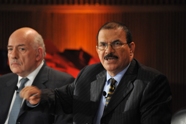 ABDULLA ALDERAZI
ABDULLA ALDERAZI
This is exactly freedom of expression, that they should be accepted as freedom of expression according to international law. And this recommendation 1724 for reforming the media is part of this. Recommendation 1725(b) focuses on national reconciliation. So national reconciliation means you have to accept what happened there and move forward. And that's what I understand.
AUDIENCE (M)
We totally believe in Bahrain that reform does not start after the Commission or after Bassiouni's report. What we want to reform is what happened - or not what happened; what we want to reform is Bahrain entirely. It's not that the results or what happened, the report or what happened since, like Nabeel said at the beginning - it's not what happened from February and three months later. The reform we need is the entire country's reform. The laws that are going on, the parliament itself, the Shura Council itself, the elections, the distribution of..
TIM SEBASTIAN
By reform you mean new people, is that it? I'll just ask him that one question: you mean new people, do you?
AUDIENCE (M)
It's not just the new people; it's a new system. It's a new system that has to run the government in the right way.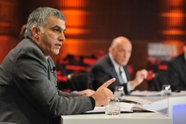 NABEEL RAJAB
NABEEL RAJAB
Just - can I? Because I realise from the beginning of the discussion we're talking about the Bassiouni report as if it is a reform. No, the Bassiouni report talks about human rights violation in three months. Yes, it could be taken as a step one to improve the situation, to be a step one to start a reform process. But it's not the roadmap for the reform. It's just a human rights report about a few months, about what has happened in that, about fact and truth of what had happened, but it's not a reform process. Yes, if there is political willingness the King could take that as an opportunity to go ahead.
TIM SEBASTIAN
Okay, all right. Before we go to the vote, ladies and gentlemen, I'm going to ask each of the panellists just to give one final sentence about their views, hoping to sway you one way or the other and then we'll go to the vote. Let's start with you. Just one sentence, and we'll work our way round the semicircle.
NABEEL RAJAB
I mean, the government who's been there for the past 42 years committing crimes and violations, till last night killing people, I don't think it's capable to conduct or to go in a process of reform.
TIM SEBASTIAN
Chris Davidson, one sentence, please.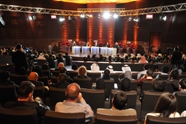 CHRISTOPHER DAVIDSON
CHRISTOPHER DAVIDSON
Ladies and gentlemen, it's insulting to our intelligence to expect the same small ruling clique in Bahrain to be capable of implementing reform if it's already seen fit to deploy mercenaries, destroy places of worship and, most barbarically, destroy the Lulu Roundabout as a symbol of their putting down the opposition.
TIM SEBASTIAN
Okay. Abdulla Alderazi, one sentence, please.
ABDULLA ALDERAZI
I believe that looking for the future, for a better Bahrain for everybody, for a lawful state, the government and Bahrain, there are people who are able and I have confidence that they'll move the country forward.
TIM SEBASTIAN
Khaled Almaeena.
KHALED ALMAEENA
Well, I think the winds of this year or the clarion call for the government to shape up and try to do reforms and get on and have a dialogue, because, as I said, there is absolutely no alternative to reform and people participation.
Vote result
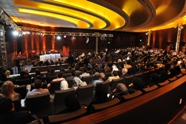 TIM SEBASTIAN
TIM SEBASTIAN
Okay, all right. Ladies and gentlemen, we're now going to vote on the motion that ‘This House has no confidence in Bahrain's promise to reform'. Let me just explain to you how the voting machines work. If you want to vote for the motion - that is the side represented by those on my right - you're going to need to press Button 1. If you want to vote against the motion - the side represented by those on my left - it's Button 2. Whichever button you want to press, please do it now. You only have to press once and we will have the results for you in about 25 seconds.
All right, there's the result. [Audience applause] 78 percent for the motion, 22 percent against. The motion has been resoundingly carried. All that remains for me to do is to thank our distinguished panellists. Thank you very much for coming tonight. Thank you to you, the audience. The Doha Debates will be back again in a month's time. Till then, from all of us on the team, have a safe journey home. Goodnight, thanks for coming. Goodnight. [Audience applause]
Watch online

